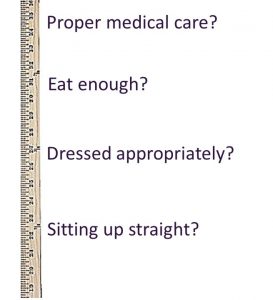Parenting in Today’s World
Parents sometimes ask themselves:
- Why does it seem so hard to parent today?
- Was it always this difficult?
I think it is harder to be what is deemed a “good” parent these days. Apart from the challenges that have come along with the electronic age, the standards for “good parenting” have changed dramatically.
How It Used to Be
 Fifty or more years ago, good parents were those who provided for their children and taught them to be mannerly, respectful, and responsible.
Fifty or more years ago, good parents were those who provided for their children and taught them to be mannerly, respectful, and responsible.
Parents worked to protect their children from the dangers of the world and worried about the basics, such as food and shelter.
- Were their children dressed appropriately?
- Did they sit up straight?
- Did they get enough to eat and proper medical care?
Successful parents produced children whose outward behavior was the yardstick against which the job the parents were doing was measured.
Little was known about the inner emotional world of children and how it developed.
The Explosion of Information Makes It Hard to Parent
Then along came new information about growth and development. Not just about how children should grow physically, but how they should grow socially, emotionally, and intellectually.
In a relatively short span of time – thirty or so years – there has been an explosion of theories about child psychology. And with this new understanding of how children develop came new stresses and pressures on parents, not just to produce children who are compliant, but ones who are emotionally and relationally healthy as well.
It may be possible to raise children who are well-behaved, but now parents are encouraged to consider the cost of achieving that outward result.
The New Yardstick
Emotional Health
This new information helps to explain why it can feel so overwhelming at times to be a “good” parent today. No longer do you just consider whether you are raising children who act appropriately, although this is important.
 As you provide structure and discipline to teach your children to be responsible and caring, you also need to keep their emotional well-being intact.
As you provide structure and discipline to teach your children to be responsible and caring, you also need to keep their emotional well-being intact.
This second piece is extremely difficult, because while you can visually determine that a child is behaving properly, you cannot see or easily measure how healthy his inner world is.
Questions you might ask that focus on nurturing emotional health are:
How can I help my child. . .
-
feel confident and capable?
-
believe in himself?
-
feel safe, secure, and loved?
-
deal with stress and crisis?
-
be aware of his own strengths and limitations?
Parent-Child Relationship
In addition to paying attention to your child’s internal world, you need to assess the quality of your relationship with your child, considering such things as building:
-
trust,
-
safety,
-
a sense of caring,
-
concern,
-
and commitment.
Teaching and modeling the qualities that contribute to emotionally healthy relationships can help instill these qualities in your child and make it more likely that they will turn to you for guidance.
This is not an easy goal to achieve for many parents who were not taught by their parents to have strong bonds. And again, how will you know if you have done a good enough job? The relational health of an individual is even harder to measure than his emotional health.
Questions you might ask that focus on building a healthy parent/child relationship are:
How can I . . .
-
encourage open communication between us?
-
build trust and safety between us?
-
help my child be trustworthy in relationships?
-
keep us close even when there are conflicts?
The Parental Iceberg
This concept of your parental responsibilities can be likened to an iceberg.
The Tip
You can see the tip, which is the outward behaviors.
Beneath the Water
Under the surface, providing the support and strength to those outward behaviors are the emotional and relational health of each child. In addition to teaching certain behaviors, you must also be mindful of your children’s self-esteem and work to maintain a loving and trusting relationship with each of your children.
These are the foundations you want to build so that your children can best cope in the world and so that you will more likely see the behaviors you want in your children.
The Three Parts Together
If you can keep these three aspects of parental responsibility in mind as you interact with your children, you may increase your chances of becoming a “good” parent as well as maintaining a connection to your children as they mature and become independent.
Parenting Today
Was parenting easier for previous generations? Sure it was harder to ensure physical health before adequate nutrition and vaccines and antibiotics were available.
But today’s parents are more aware of the importance of providing emotional and relational health to their children – and there is no shot to administer to accomplish the task!
So you aren’t mistaken if you think it’s incredibly difficult to be a “good parent” these days!
By Diane Wagenhals, Director, Parenting Resource and Education Network
____________________________________________________________
For more information about general parenting, check out the following books. Purchasing books from our website through Amazon.com supports the work we do to help parents do the best job they can to raise their children.
<recommended books about parenting
<all our recommended parenting books
____________________________________________________________




